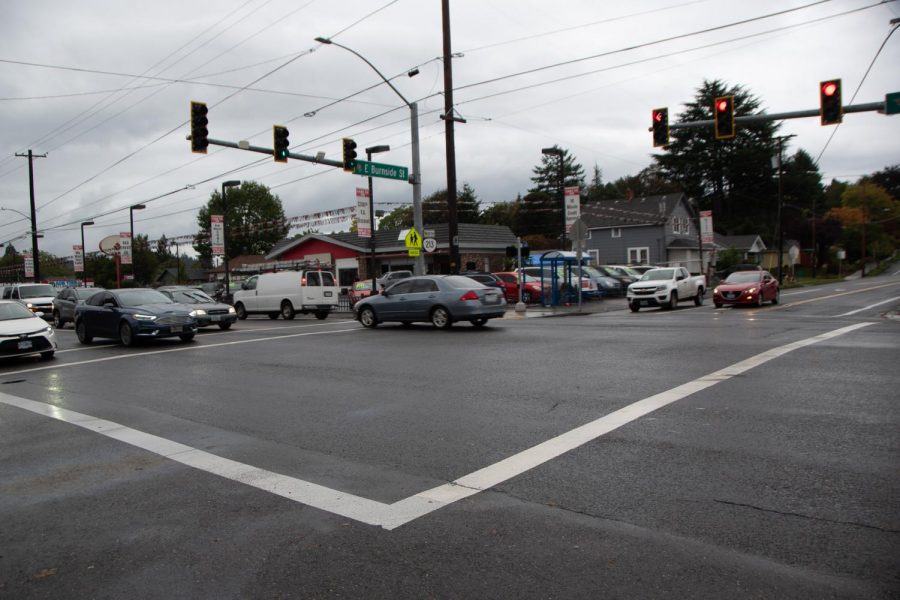Intersectionality: Why it Matters
Intersectionality is a term that was coined by Kimberlé Crenshaw in 1989.
October 6, 2021
Picture an intersection.
Multiple streets conjoin to make one multifaceted area.
It is intricate, versatile, and demands your attention.
If you ignore the convergence, you sabotage the individuals in your path. Your understanding of the inner workings of the intersection is vital in keeping everyone safe.
You simply cannot ignore the complexity.
Individuals facing oppression, especially those who experience multiple forms, mirror this concept. Similar to the cross of an intersection, different forms of oppression don’t exist independently of each other; they work in tandem.
Intersectionality, a term coined by Kimberlé Crenshaw, puts a name to a concept that has been historically neglected: individuals experience an overlap of different types of discrimination, and thus experience a new, unique form of oppression. Without regard to the intersections of social identities, we dismiss the plight of marginalized communities and perpetuate an even deeper inequity.
Although intersectionality is applicable to a myriad of diverse identities, it was created on behalf of Black women and elucidated their oppression as more than just racism and sexism. The term was needed to distinguish why the broad feminist movement, or what’s now known as “white feminism,” didn’t offer liberation to African-American women. It catered to the sexism that white women faced, rather than being inclusive to all women with differing intersecting identities and hence, a different, distinct form of oppression.
After years of adhering to traditional feminist and antiracist theory, it became clear that these movements couldn’t accurately portray the experience of Black women. A new, less binary way of thinking was born; African-American women don’t experience racism and sexism as independent forms of oppression, but rather a combination of the two.
This realization, crucial and omnipotent, was a microcosm of something even bigger; our identities — gender, sexual, cultural, racial, socioeconomic, etc. — are all interconnected.
Consequently, through the creation of intersectionality, Crenshaw changed the traditional narrative of oppression, and ultimately ended a period of ignorance — at least for some.
Many individuals are still unaware, and perhaps intentionally so, of intersectionality’s intrinsic nature in America.
Its relevance is everywhere. Just look around you. Acknowledge the adversity of transgender women of color and disabled, gay men. Or, the nonbinary individuals in the working class. Or, the bisexual men of color. The list goes on.
The need for intersectionality permeates America. It’s relevant to our medical and mental health care system, the criminal justice system, and politics, and it’s applicable to education, housing, and the workplace. Once again, the list goes on.
As a whole, these institutions thrive on exclusivity. When they hold the ability to serve merely the majority, they do. So, a citizen with multiple marginalized identities is subject to institutionalized mistreatment on multiple levels.
Our world is plagued with inequality, and ignoring the intersections further perpetuates it. Denying their existence has a considerable influence on our country’s social and political state, and consequently, many people may become complicit with the status quo.
For the mere safety and autonomy of minorities, the acknowledgment of intersectionality cannot wait. But, the word itself cannot independently make justice arrive. We need to push for change.
It is time to integrate intersectionality into our conscience and at the very least, increase visibility for individuals it applies to.
The intersections, both physical and conceptual, are synonymous. Without your undivided attention, a crash is bound to happen, and people who reside in the center of the intersections are at the mercy of this.
The onus is on those who find themselves privileged to eradicate harm.
Awareness is the first step.






Ryan Darmody • Oct 7, 2021 at 9:00 am
Thank you, Maya, for so eloquently helping to to elucidate the importance of intersectionality. For those committed to fighting oppression, it is an essential idea to understand.